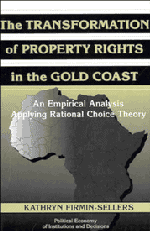 The Transformation of Property Rights in the Gold Coast
The Transformation of Property Rights in the Gold Coast Book contents
- Frontmatter
- Contents
- Series editor' preface
- Preface
- Acknowledgments
- Chapter 1 Introduction
- PART I THE INSTITUTIONS OF THE COLONIAL STATE
- PART II THE REINVENTION OF TRADITION: THE EVOLUTION OF PROPERTY RIGHTS UNDER INDIRECT RULE
- Chapter 3 Institutional failure in the Ga state
- Chapter 4 Institutional creation in Akyem Abuakwa: The politics of property rights
- PART III THE TRANSITION TO INDEPENDENT GOVERNMENT
- Notes
- Bibliography
- Index
Chapter 3 - Institutional failure in the Ga state
Published online by Cambridge University Press: 08 January 2010
- Frontmatter
- Contents
- Series editor' preface
- Preface
- Acknowledgments
- Chapter 1 Introduction
- PART I THE INSTITUTIONS OF THE COLONIAL STATE
- PART II THE REINVENTION OF TRADITION: THE EVOLUTION OF PROPERTY RIGHTS UNDER INDIRECT RULE
- Chapter 3 Institutional failure in the Ga state
- Chapter 4 Institutional creation in Akyem Abuakwa: The politics of property rights
- PART III THE TRANSITION TO INDEPENDENT GOVERNMENT
- Notes
- Bibliography
- Index
Summary
This chapter examines the indigenous elite's response to the commercialization of land in the Ga state. I focus specifically on the efforts of the Reindorf family to define and enforce a distributionally favorable property rights system. Briefly, I argue that the Reindorf family reinvented Ga customary law, articulating a tradition that gave them exclusive rights to a significant portion of Ga land. They sought to enforce this new custom by reinventing the institutions of the traditional state so as to gain influence over the Ga Paramount Chief. Ultimately, their efforts failed. I attribute that failure to the elite's inability to manipulate the linkages between the traditional state and the British colonial state. The Ga elites were never able to persuade the British to use the colonial state's coercive authority on their behalf. Thus, distributional conflict went unchecked; property rights remained fluid and insecure.
I develop this argument in four stages. First, I provide a brief description of the Ga state and discuss the nature of Ga customary law and Ga traditional institutions prior to colonization. I then outline the changes wrought by indirect rule. Second, I examine the elite response to the commercialization of land. What type of property rights system did they articulate, and how did they try to enforce those rights? Third, I analyze other Ga citizens' reactions to the elite's overture. I trace the efforts of one group, the Manbii Party, to enforce an alternative vision of customary land tenure and Ga tradition.
- Type
- Chapter
- Information
- The Transformation of Property Rights in the Gold CoastAn Empirical Study Applying Rational Choice Theory, pp. 36 - 58Publisher: Cambridge University PressPrint publication year: 1996
